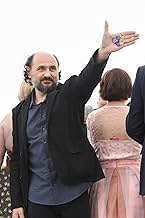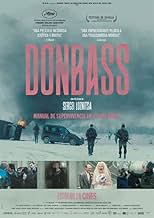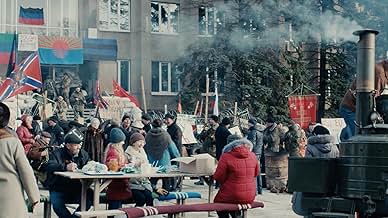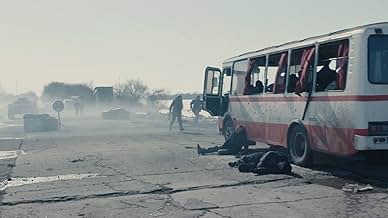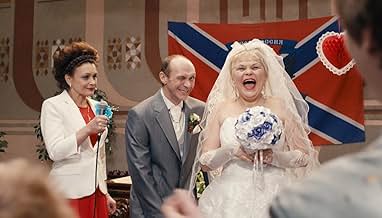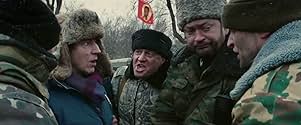IMDb-BEWERTUNG
6,6/10
5141
IHRE BEWERTUNG
In der Ostukraine beginnt die Gesellschaft zu zerfallen, und es zeigen sich die Auswirkungen von Propaganda und Manipulation in dieser Post-Wahrheits-Ära.In der Ostukraine beginnt die Gesellschaft zu zerfallen, und es zeigen sich die Auswirkungen von Propaganda und Manipulation in dieser Post-Wahrheits-Ära.In der Ostukraine beginnt die Gesellschaft zu zerfallen, und es zeigen sich die Auswirkungen von Propaganda und Manipulation in dieser Post-Wahrheits-Ära.
- Regie
- Drehbuch
- Hauptbesetzung
- Auszeichnungen
- 9 Gewinne & 14 Nominierungen insgesamt
Olesya Zhurakivska
- Girl with bucket
- (as Olesya Zhurakovskaya)
Empfohlene Bewertungen
Saw this at the Rotterdam film festival 2019. If this movie wanted to showcase chaos and lawlessness in a warzone annex newly born country, they did it very well. On the other hand, we did not get a chance to feel involved with the local people as we hardly know enough about the circumstances and the differences that kept those people apart. The division in loosely coupled chapters did not help either. There is nothing to bind the chapters together, merely leading to several (and now for something completely different) sketches. All of them interesting in their own way, but we are left to our own devices to arrive at a common morale or a message.
We often heard the word "fascist" used, more as a general word to denote something negative, rather than having to do with the real meaning of fascism (just like the word "communist" in the Mccarthyism era in the USA was used for everything beyond the norm). I got the impression that the soldiers at the road blocks also did not know exactly what was going on and in which battle(s) they were involved. Similarly, the man tied to a lantern pole and exposed to the whims of the public, was also often accused of being one of the fascists over there, leaving us to assume that the people "over there" also used some label for the opposite side. As a side note, the German journalist held up at one of the road blocks was indirectly labelled as a fascist, because he may not be a fascist himself, but his father and grandfather surely had been one (I quote).
The movie consists of a series of separate chapters, on very different locations and in even more different settings, among which a road block and a wedding. Only the first and last chapter were connected by showing the same persons and location, having their make up ready in preparation of a "real live" scene. The ending of the second instance was a bit unexpected, however, but fitted very well in the "fake news" theme of the movie. We hear, for instance, a witness who saw a mass killing from her balcony, give her "testimony" two times in front of a camera crew, seemingly spontaneous including tears and being unable to speak further. We know better while watching how the scene was created twice (a second take was needed for a wider shot, but the "spontaneous" elements were identical).
All in all, the movie kept me at a distance and did not involve me. Even worse, I saw the well-known problems of former Sovjet-countries also manifest here, like corruption, unability to depend on the law, and self-serving civil servants. (Is this a pun? It sounds like one but not intended.)
The emphasis on fake news as the central theme of this movie, escaped me. But I see it in any synopsis or review, so I may have missed something important. Or was it intended to suggest a contemporary theme, something we should be concerned about?? I've read somewhere that the stories we see were all based on previous "fake news" clips on social media. In hindsight, this may explain the assortment of loosely coupled "sketches" without a common central theme.
We often heard the word "fascist" used, more as a general word to denote something negative, rather than having to do with the real meaning of fascism (just like the word "communist" in the Mccarthyism era in the USA was used for everything beyond the norm). I got the impression that the soldiers at the road blocks also did not know exactly what was going on and in which battle(s) they were involved. Similarly, the man tied to a lantern pole and exposed to the whims of the public, was also often accused of being one of the fascists over there, leaving us to assume that the people "over there" also used some label for the opposite side. As a side note, the German journalist held up at one of the road blocks was indirectly labelled as a fascist, because he may not be a fascist himself, but his father and grandfather surely had been one (I quote).
The movie consists of a series of separate chapters, on very different locations and in even more different settings, among which a road block and a wedding. Only the first and last chapter were connected by showing the same persons and location, having their make up ready in preparation of a "real live" scene. The ending of the second instance was a bit unexpected, however, but fitted very well in the "fake news" theme of the movie. We hear, for instance, a witness who saw a mass killing from her balcony, give her "testimony" two times in front of a camera crew, seemingly spontaneous including tears and being unable to speak further. We know better while watching how the scene was created twice (a second take was needed for a wider shot, but the "spontaneous" elements were identical).
All in all, the movie kept me at a distance and did not involve me. Even worse, I saw the well-known problems of former Sovjet-countries also manifest here, like corruption, unability to depend on the law, and self-serving civil servants. (Is this a pun? It sounds like one but not intended.)
The emphasis on fake news as the central theme of this movie, escaped me. But I see it in any synopsis or review, so I may have missed something important. Or was it intended to suggest a contemporary theme, something we should be concerned about?? I've read somewhere that the stories we see were all based on previous "fake news" clips on social media. In hindsight, this may explain the assortment of loosely coupled "sketches" without a common central theme.
This movie is a sequence of barely connected vignettes about life in Russian-occupied east of Ukraine, and just how horrific and grotesque it is to live there at the moment. It captures all of the details flawlessly - it sometimes is shot for shot live-action version of existing videos on Youtube, but with real actors. Donbass is depressing as hell but so is the existence in that region, so it is well deserving of many awards that this movie received.
This film was sponsored and financed by various organizations in the Ukraine and European countries, so one expects (and gets) a generally uncomplimentary picture of the people of the breakaway Donbass region of Ukraine. However, the picture is not one-sided; for instance, we are shown people living in crowded, unsanitary cellars to escape the constant, unpredictable Ukrainian shelling of Donbass cities and towns, with no military objectives and plenty of civilian casualties.
The question is: what is real and what is staged or reenacted? Some sequences (such as the wedding) may have been shot from reality, perhaps with some rehearsal, but others are clearly staged, such as that where a prisoner Ukrainian soldier is abused and insulted by a crowd. The framing of the shots is careful and deliberate, and the prisoner, as many other characters in the movie is played by a professional actor. Finally, one episode is clearly trying to depict the banditry and brutality of the Donbass militia, so one could hardly expect the militants to appear voluntarily in front of the camera in an unfavorable light.
Perhaps the key to the film is given by Ukrainian director Sergey Loztnitsa in the first episode, where a crew of actors is seen staging and playing a bombing incident for the camera (the same crew is attacked in the end but we are never sure if the violence is real or staged). Perhaps Loznitsa is trying to warn the viewer to take the proceedings with a grain of salt. The Donbass is referred to in the movie as "separatist" and as an "occupied territory" of the Ukraine. The first is correct but the second arguable: no occupiers are in sight. All in all an incomplete but fascinating view of the Donbass and its people in the period preceding the present war, although watchers should exercise their critical sense.
The question is: what is real and what is staged or reenacted? Some sequences (such as the wedding) may have been shot from reality, perhaps with some rehearsal, but others are clearly staged, such as that where a prisoner Ukrainian soldier is abused and insulted by a crowd. The framing of the shots is careful and deliberate, and the prisoner, as many other characters in the movie is played by a professional actor. Finally, one episode is clearly trying to depict the banditry and brutality of the Donbass militia, so one could hardly expect the militants to appear voluntarily in front of the camera in an unfavorable light.
Perhaps the key to the film is given by Ukrainian director Sergey Loztnitsa in the first episode, where a crew of actors is seen staging and playing a bombing incident for the camera (the same crew is attacked in the end but we are never sure if the violence is real or staged). Perhaps Loznitsa is trying to warn the viewer to take the proceedings with a grain of salt. The Donbass is referred to in the movie as "separatist" and as an "occupied territory" of the Ukraine. The first is correct but the second arguable: no occupiers are in sight. All in all an incomplete but fascinating view of the Donbass and its people in the period preceding the present war, although watchers should exercise their critical sense.
I was stunned for most of this. I knew about a plane being shot down and Crimea being taken by the Russians and that there was some sort of ongoing conflict but I was not prepared for this. Described somewhere as a black comedy but I didn't find myself even smiling. There may be a ridiculous element to the Kafkaesque madness depicted here but it is no laughing matter. I note that the director is mainly known for documentaries and this certainly plays like one as we are thrust amidst the craziness as good is described as bad, theft as a donation and killing and maiming for fun as loyalty and an expression of love for the motherland, or fatherland or whatever horrible nastiness underlies these crimes. I think I maybe gained a little more awareness of what might be going on as Russians and Ukrainians and Ukrainians who speak Russian and perhaps prefer Russia to Ukraine prefer to play war games than live their life. This may not have particularly clarified everything for me but I was immensely impressed by the way the film had been made and constructed and how a busy, even chaotic scene one minute could lead to a prolonged and static shot the next, leaving to ponder just what was happening and for goodness sake why!
In an era of fake news and alternative facts, when the public's familiarity with far-flung military engagements derives as much from civilian smartphones as on-the-front-line news reports, and where mass falsehoods promulgate like wildfire via questionable sources on social media, control of propaganda has become a key component of modern warfare. Focusing on the conflict in eastern Ukraine between Ukrainian loyalists and Russian-backed separatists, writer/director Sergey Loznitsa adopts a savagely satirical and unapologetically ironic tone as he examines the corrosive effects hateful propaganda can have at all levels of society. The film presents the Donbass region as a pseudo-Orwellian dystopia of endemic corruption, state-sanctioned discrimination, sycophantic bureaucracy, and unashamed media manipulation. There are no heroes here, because everyone is tainted. The lack of a standard plot and the absence of a protagonist won't be to everyone's liking, whilst the dearth of any geo-political contextualisation will alienate others. Nevertheless, this is sobering stuff, and as timely as it is despairing.
Donbass is made up of thirteen segments, each of which plays out in its entirety before we move onto the next. Relatively self-contained, the only real connection between segments is that each leads to the next via a particular character, who hands the narrative over to someone else (like a baton in a relay race). So, for example, a segment depicting a hospital administrator is followed by a segment in which that administrator is stopped at a checkpoint, where a foreign journalist is being questioned about his passport, and whom we follow into the next segment. And so on. No character, however, appears in more than two segments. Each segment is based on a documented real-life incident that took place in the Donetsk People's Republic (a pro-Russian proto-state in the Donbass) in 2014-2015, with several derived from amateur footage posted on YouTube. Scenes include a woman (Olesya Zhurakivska) dumping a bucket of faeces over a politician (Grigory Masliuk), claiming he libelled her; Mikhalych (Boris Kamorzin), a maternity hospital administrator, proudly showing his unenthusiastic staff that the hospital is fully stocked; a German journalist (Thorsten Merten) being interrogated at a roadblock; Semyon (Aleksandr Zamuraev) learning that his stolen jeep has been recovered by the military; a captured soldier (Valeriy Antonyuk) is accused of being part of a Ukrainian "extermination squad", and is tied to a pole, ridiculed, and eventually beaten by a civilian mob; and a wedding.
Having covered the origins of the War in Donbass in documentary form in Maidan (2014), Loznitsa is not especially interested in context, partly because his point is that no amount of context can explain the absurdity of what is happening. Essentially, however, the background to the film is that after pro-Russian President Viktor Yanukovych was overthrown in November 2013, a series of anti-Revolutionary protests took place across east and south Ukraine, particularly in the Donbass region. These protests soon escalated into open conflict between the Russian-funded, and often Russian staffed, separatist forces, and loyalist Ukrainian forces.
Obviously drawing inspiration from Elem Klimov's masterful Geh und sieh (1985), one of the greatest anti-war movies ever made, Loznitsa is a formalist in the best sense of the term, and working with legendary cinematographer Oleg Mutu, he shoots Donbass in the style of cinéma vérité, hand-held and as unmediated as possible, shunning the presentation of any one person's subjective perspective. Most of the segments are shot in single-takes, which has the effect of heightening tension to almost unbearable degrees, knowing that at any moment, a bomb blast could wipe out the cast or an idiot with a gun and a grudge could open fire. In this sense, Loznitsa brilliantly evokes the unpredictability of war in a manner rarely seen in films with ten times the budget.
The opening segment sets the satirical tone brilliantly. Watching a group of people having makeup applied, we think we are on a film or TV set, but in actual fact, these people are being made up to appear in a "factual" news report as shell-shocked locals, complete with a director telling them what to say, and a stage-managed warzone in the background. It's the very definition of fake news and immediately recalls Barry Levinson's superb Wag the Dog - Wenn der Schwanz mit dem Hund wedelt (1997), in which a White House spin-doctor hires a Hollywood producer to "produce" a fake war so as to distract from a presidential sex scandal.
The film's dark comedy reaches its zenith in the scene where Semyon heads to a military barracks because he's been told the separatist forces have recovered his stolen jeep. Believing that he will be getting the jeep back, he instead discovers that the military want him to sign the car over to them. When he refuses, he's hit with an exorbitant fine. Marched into another room, he finds that room full of men, all on their phones trying to raise funds to pay the fines with which they too have been hit. It's like something out of Douglas Adams - a room full of suit-wearing middle-class men all desperately trying to do the exact same thing.
Thematically, each segment in Donbass has its own target, whether it be a self-serving hospital administrator, a soldier abusing the power he has over civilians, or an uninformed mob interested only in blaming someone (anyone) for their misfortunes. No one escapes censure because no one is wholly innocent. The scene with the soldier tied to the pole is especially difficult to watch. Tied up by separatist forces who encourage passing civilians to verbally abuse him, things soon escalate to spitting and throwing food, and, ultimately, to brutal physical assault. When some of the thugs responsible attend a wedding in the following segment, they amuse themselves and the guests by showing smartphone footage of the man being beaten, whilst the bride declares that she hopes her son is born "with a rifle in his arms".
With a lack of any heroes, or even a protagonist with whom we can identify, the one tone that links the various segments is bitterness; a bitterness deeply ingrained in the souls of the people, who believe the lies they are being fed, with virtually every conversation returning in some way to issues of partisanship. One of the questions Loznitsa is asking is how one can broach reconciliation between people whose enmities run so deep. Positing that the war is being fought as much with lies and propaganda as it is with weapons, he is suggesting that the separatist forces are criminals as much as they are combatants, and he depicts them as inherently unscrupulous, unconcerned with Ukraine or its people, even as they position themselves as the country's saviours.
In terms of problems, although Loznitsa does depict loyalist forces here and there, most of his invective is aimed at the separatists, and in this sense, the film could be accused of being unbalanced. Another issue is the lack of any political contextualisation, with no explanation of who is fighting, nor what they are fighting for, as combatants are introduced without any kind of identification. I understand what Loznitsa is trying to do here - political context is irrelevant in a conflict built on lies and absurdity - but some kind of concession to an audience not familiar with the politics would have been immensely helpful. Another issue is that because there is no central character, there is no real emotional connection. We certainly feel sympathy with some, but there is never any real pathos.
A searing satirical portrait of a place where human interaction has devolved to a level just above barbarism, in the post-truth politics of Donbass, horror, violence, abuse of power, Orwellian propagation (and acceptance) of fake news, and war hysteria masquerading as patriotism are the order of the day. Loznitsa doesn't see the conflict as a legitimate civil war, but instead gang warfare, with the concept of civil war used to cover-up and legitimatise criminality. In the Donbass of the film, reality is a commodity, and its only value is in whether or not it can be sold to the masses. Of course, this situation isn't unique to Ukraine - this simulacrum of a functioning society is replicated all over the world, including the United States, where governmental deception and presidential falsehoods haven't reached the level of Donbass, but are certainly moving in that direction. And for people who still value concepts such as truth, honour, and inclusiveness, this is a worrying trend. Because when truth can no longer be used as a weapon, it must be replaced with something far more powerful and far more dangerous - lies.
Donbass is made up of thirteen segments, each of which plays out in its entirety before we move onto the next. Relatively self-contained, the only real connection between segments is that each leads to the next via a particular character, who hands the narrative over to someone else (like a baton in a relay race). So, for example, a segment depicting a hospital administrator is followed by a segment in which that administrator is stopped at a checkpoint, where a foreign journalist is being questioned about his passport, and whom we follow into the next segment. And so on. No character, however, appears in more than two segments. Each segment is based on a documented real-life incident that took place in the Donetsk People's Republic (a pro-Russian proto-state in the Donbass) in 2014-2015, with several derived from amateur footage posted on YouTube. Scenes include a woman (Olesya Zhurakivska) dumping a bucket of faeces over a politician (Grigory Masliuk), claiming he libelled her; Mikhalych (Boris Kamorzin), a maternity hospital administrator, proudly showing his unenthusiastic staff that the hospital is fully stocked; a German journalist (Thorsten Merten) being interrogated at a roadblock; Semyon (Aleksandr Zamuraev) learning that his stolen jeep has been recovered by the military; a captured soldier (Valeriy Antonyuk) is accused of being part of a Ukrainian "extermination squad", and is tied to a pole, ridiculed, and eventually beaten by a civilian mob; and a wedding.
Having covered the origins of the War in Donbass in documentary form in Maidan (2014), Loznitsa is not especially interested in context, partly because his point is that no amount of context can explain the absurdity of what is happening. Essentially, however, the background to the film is that after pro-Russian President Viktor Yanukovych was overthrown in November 2013, a series of anti-Revolutionary protests took place across east and south Ukraine, particularly in the Donbass region. These protests soon escalated into open conflict between the Russian-funded, and often Russian staffed, separatist forces, and loyalist Ukrainian forces.
Obviously drawing inspiration from Elem Klimov's masterful Geh und sieh (1985), one of the greatest anti-war movies ever made, Loznitsa is a formalist in the best sense of the term, and working with legendary cinematographer Oleg Mutu, he shoots Donbass in the style of cinéma vérité, hand-held and as unmediated as possible, shunning the presentation of any one person's subjective perspective. Most of the segments are shot in single-takes, which has the effect of heightening tension to almost unbearable degrees, knowing that at any moment, a bomb blast could wipe out the cast or an idiot with a gun and a grudge could open fire. In this sense, Loznitsa brilliantly evokes the unpredictability of war in a manner rarely seen in films with ten times the budget.
The opening segment sets the satirical tone brilliantly. Watching a group of people having makeup applied, we think we are on a film or TV set, but in actual fact, these people are being made up to appear in a "factual" news report as shell-shocked locals, complete with a director telling them what to say, and a stage-managed warzone in the background. It's the very definition of fake news and immediately recalls Barry Levinson's superb Wag the Dog - Wenn der Schwanz mit dem Hund wedelt (1997), in which a White House spin-doctor hires a Hollywood producer to "produce" a fake war so as to distract from a presidential sex scandal.
The film's dark comedy reaches its zenith in the scene where Semyon heads to a military barracks because he's been told the separatist forces have recovered his stolen jeep. Believing that he will be getting the jeep back, he instead discovers that the military want him to sign the car over to them. When he refuses, he's hit with an exorbitant fine. Marched into another room, he finds that room full of men, all on their phones trying to raise funds to pay the fines with which they too have been hit. It's like something out of Douglas Adams - a room full of suit-wearing middle-class men all desperately trying to do the exact same thing.
Thematically, each segment in Donbass has its own target, whether it be a self-serving hospital administrator, a soldier abusing the power he has over civilians, or an uninformed mob interested only in blaming someone (anyone) for their misfortunes. No one escapes censure because no one is wholly innocent. The scene with the soldier tied to the pole is especially difficult to watch. Tied up by separatist forces who encourage passing civilians to verbally abuse him, things soon escalate to spitting and throwing food, and, ultimately, to brutal physical assault. When some of the thugs responsible attend a wedding in the following segment, they amuse themselves and the guests by showing smartphone footage of the man being beaten, whilst the bride declares that she hopes her son is born "with a rifle in his arms".
With a lack of any heroes, or even a protagonist with whom we can identify, the one tone that links the various segments is bitterness; a bitterness deeply ingrained in the souls of the people, who believe the lies they are being fed, with virtually every conversation returning in some way to issues of partisanship. One of the questions Loznitsa is asking is how one can broach reconciliation between people whose enmities run so deep. Positing that the war is being fought as much with lies and propaganda as it is with weapons, he is suggesting that the separatist forces are criminals as much as they are combatants, and he depicts them as inherently unscrupulous, unconcerned with Ukraine or its people, even as they position themselves as the country's saviours.
In terms of problems, although Loznitsa does depict loyalist forces here and there, most of his invective is aimed at the separatists, and in this sense, the film could be accused of being unbalanced. Another issue is the lack of any political contextualisation, with no explanation of who is fighting, nor what they are fighting for, as combatants are introduced without any kind of identification. I understand what Loznitsa is trying to do here - political context is irrelevant in a conflict built on lies and absurdity - but some kind of concession to an audience not familiar with the politics would have been immensely helpful. Another issue is that because there is no central character, there is no real emotional connection. We certainly feel sympathy with some, but there is never any real pathos.
A searing satirical portrait of a place where human interaction has devolved to a level just above barbarism, in the post-truth politics of Donbass, horror, violence, abuse of power, Orwellian propagation (and acceptance) of fake news, and war hysteria masquerading as patriotism are the order of the day. Loznitsa doesn't see the conflict as a legitimate civil war, but instead gang warfare, with the concept of civil war used to cover-up and legitimatise criminality. In the Donbass of the film, reality is a commodity, and its only value is in whether or not it can be sold to the masses. Of course, this situation isn't unique to Ukraine - this simulacrum of a functioning society is replicated all over the world, including the United States, where governmental deception and presidential falsehoods haven't reached the level of Donbass, but are certainly moving in that direction. And for people who still value concepts such as truth, honour, and inclusiveness, this is a worrying trend. Because when truth can no longer be used as a weapon, it must be replaced with something far more powerful and far more dangerous - lies.
Wusstest du schon
- WissenswertesOfficial submission of Ukraine for the 'Best Foreign Language Film' category of the 91st Academy Awards in 2019.
- VerbindungenReferenced in Radio Dolin: Sergei Loznitsa (2022)
- SoundtracksThe National Anthem of Ukraine
Lyrics by Pavlo Chubynsky
Music by Mikhailo Verbytsky
Performed by The Veryovka National Academic Ukrainian Folk Choir
Top-Auswahl
Melde dich zum Bewerten an und greife auf die Watchlist für personalisierte Empfehlungen zu.
- How long is Donbass?Powered by Alexa
Details
- Erscheinungsdatum
- Herkunftsländer
- Offizieller Standort
- Sprachen
- Auch bekannt als
- Донбас
- Drehorte
- Produktionsfirmen
- Weitere beteiligte Unternehmen bei IMDbPro anzeigen
Box Office
- Weltweiter Bruttoertrag
- 141.067 $
- Laufzeit
- 2 Std. 2 Min.(122 min)
- Farbe
- Seitenverhältnis
- 2.35 : 1
Zu dieser Seite beitragen
Bearbeitung vorschlagen oder fehlenden Inhalt hinzufügen

![Trailer [OV] ansehen](https://m.media-amazon.com/images/M/MV5BZDBjMTdhZDYtOWI4NS00NmYwLWExYjgtY2VmYzQxYzlkNDhmXkEyXkFqcGdeQXRyYW5zY29kZS13b3JrZmxvdw@@._V1_QL75_UX500_CR0)
